THE DRIVE FOR HEALING
CATHLEEN AND HER HUSBAND MAKE THE 4.5 HOUR TRIP TO KARMANOS EVERY TWO WEEKS, AND IT’S BEEN WORTH IT.
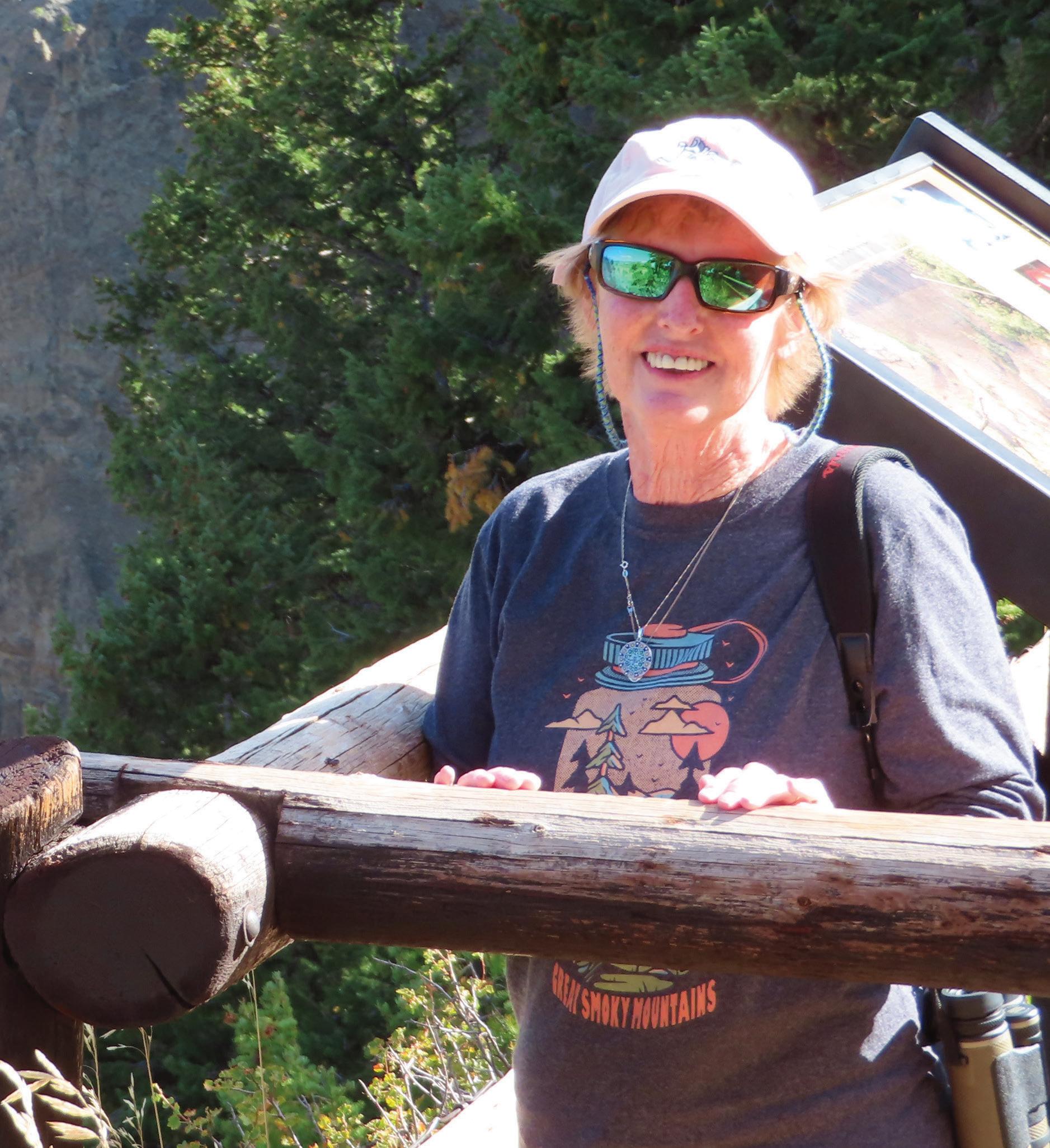
SPRING/SUMMER 2023 HOPE
A PUBLICATION FROM THE KARMANOS
CANCER INSTITUTE
TO TRIUMPHS OF EVERY KIND. CANCER IS A BEGINNING.
In the fight against cancer, you want every advantage to beat the disease. There is no bigger advantage than having the experts at Karmanos Cancer Institute in your corner.
As one of Michigan’s preferred cancer treatment providers, we give you access to more than 250 promising new treatments found only at Karmanos. We give you your best chance forward.

PROUDLY A PART OF McLAREN
Karmanos Hope, Spring/Summer 2023 2
DEAR PATIENTS, FAMILIES AND COMMUNITY MEMBERS,
As spring blossoms, we celebrate the accomplishments and triumphs we’ve experienced throughout the colder months. This vibrant season invites us to embrace new possibilities, set inspiring goals, and welcome the warmth and rejuvenation that lies ahead.
For many cancer patients, reflecting on their diagnosis, treatment, and recovery inspires them to recognize their progress and envision what they can still accomplish. At Karmanos Cancer Institute, we take pride in helping our patients discover and embrace hope, acknowledging that this period can be a transformative beginning despite their cancer diagnosis. In this publication of Hope, we introduce you to patients with that mindset.
Our cover story features Cathleen from Ohio, who was diagnosed with pancreatic cancer. Faced with a difficult prognosis, she relentlessly researched new therapies and found a promising clinical trial at Karmanos. Her determination and drive to find the best care gave her renewed hope.
We also share Paris’s story, who is living with multiple myeloma. Though he initially delayed seeking medical care, he has reached a stage in his battle where he cherishes life and continues pursuing his passion for filmmaking.
Kelly, a Bay City resident, discovered she had breast cancer through a social media platform. Her breast surgeon praises her grace and determination throughout her treatment journey - surgery, chemotherapy, and radiation.
Andy and his wife remain steadfast through his lung cancer treatments, seeking to educate and inspire their community in Lansing.
Social media played a vital role for Sara, who connected with hundreds of young ovarian cancer survivors through her Instagram support group. She now encourages all cancer patients to find “their” people for support.


Bill, our first prostate cancer patient in Maumee, Ohio, generously brings donuts for his care team even after completing treatment. Read about his latest gift to the center as he celebrates recovery and looks forward to creating cherished memories with his family.
We are thrilled to announce the opening of our newest cancer center, Karmanos Cancer Institute - Roseville, in January. This addition demonstrates our commitment to providing innovative cancer treatment to more patients in Michigan and Ohio.
We are honored to serve our communities, raise awareness, and celebrate the courage and resilience of our patients. Thank you for your unwavering support and for being essential to our patients’ success.
Warm regards,
 Joseph P. Uberti, M.D., Ph.D. Interim President and CEO
Joseph P. Uberti, M.D., Ph.D. Interim President and CEO
 Barbara Ann Karmanos Cancer Institute
Brian R. Gamble President Karmanos Cancer Hospital & Network
Barbara Ann Karmanos Cancer Institute
Brian R. Gamble President Karmanos Cancer Hospital & Network
Karmanos Cancer Institute 3
LIFE-SAVING STUDY: CLINICAL TRIAL GIVES
PANCREATIC CANCER PATIENT RENEWED HOPE
Today, nearly a year after enrolling in a clinical trial that targets the specific genetic driver of her cancer, Janosko has no visible sign of the disease. Her extraordinary outcome offers hope to future cancer patients — including those with late-stage pancreatic cancer.
A Particularly Deadly Disease
Due partly to the pancreas’ location in the upper abdomen, it can be challenging to diagnose the disease at an early stage. By diagnosis, for most patients, the disease has often metastasized and spread to other organs, thus eliminating surgical treatment options. This was the case for Janosko.
According to the American Society of Clinical Oncology, the five-year survival rate for pancreatic cancer is just 11 percent. The survival rate for patients with stage IV disease is around 2 to 3 percent.
For these reasons, Janosko’s local hospital doctors did not offer her much hope.
In the fall of 2020, when Cathleen Janosko noticed she had an upset stomach and felt more tired than usual, she did not think much of it. After all, many people experience those symptoms from time to time.
But a few months later, when those vague symptoms turned into a deep-seated pain in her upper right abdomen, she knew something was wrong.
Janosko, who lives in rural southeast Ohio, went to a local hospital for an ultrasound. Then her doctor called with the news: the scan showed a mass in her liver. Subsequent computed tomography (CT) revealed more masses in her pancreas and lower abdomen. The diagnosis was stage IV pancreatic cancer.
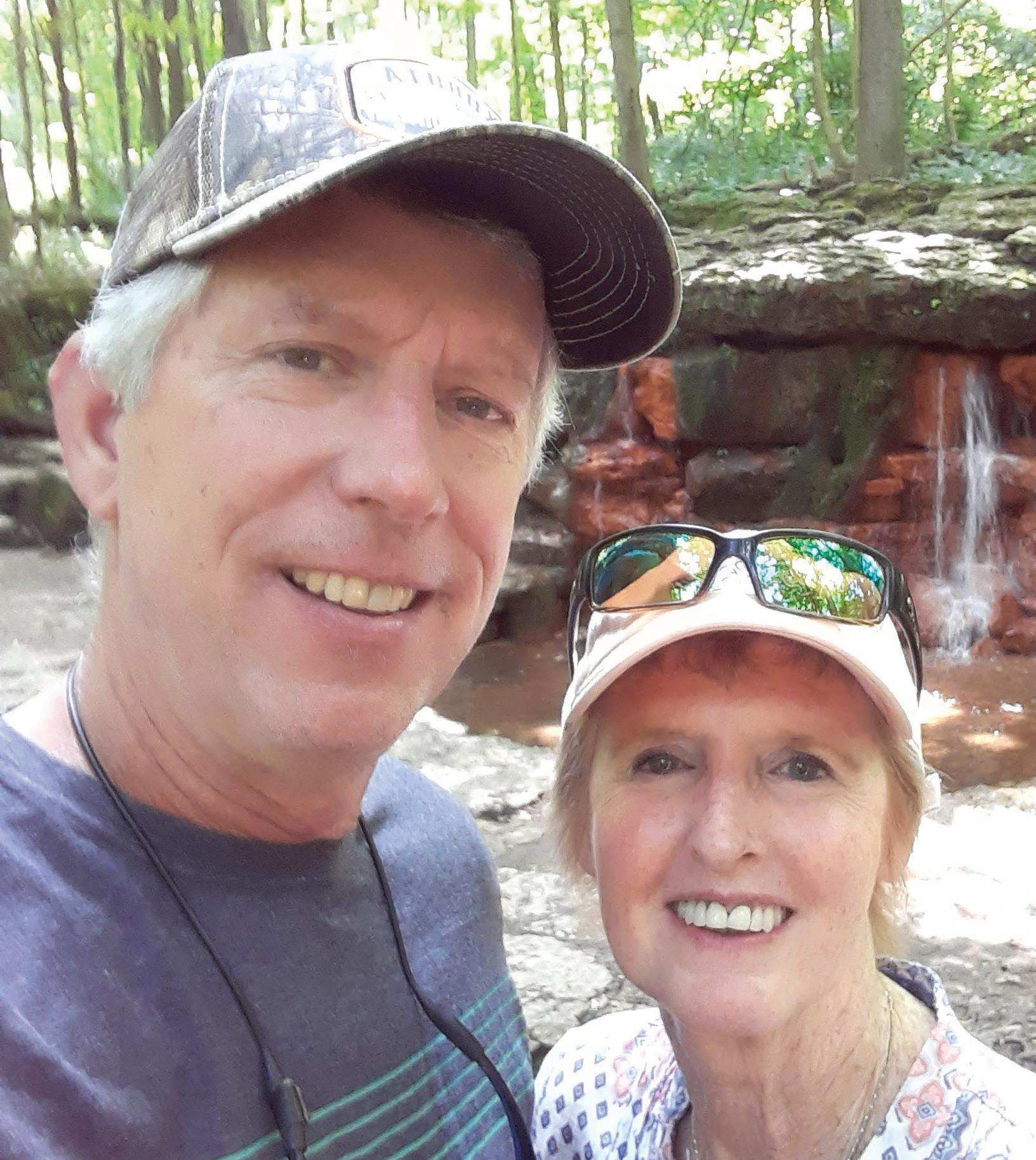
“I was devastated and very scared,” said 63-year-old Janosko. “I knew my cancer was life-threatening. I also thought of my parents. I had lost my father to lung cancer and my mother to uterine cancer.”
That was the beginning of Janosko’s cancer journey. Thankfully, subsequent testing and loads of late-night research on the specifics of her disease led her to the Clinical Trials Program at the Karmanos Cancer Center.
“They said there was nothing more they could offer besides chemotherapy, with no subsequent testing,” she explained. “They gave me just two to six months to live. That’s when I began doing my research.”
Janosko transferred to a larger area hospital where she began receiving chemotherapy. Doctors there also performed a genetic test on the tumor. The results exposed a targetable gene fusion called NRG1, which is rare in cancers.
“I had been researching all I could about the disease on various pancreatic cancer support group websites,” Janosko said. “I noticed many survivor stories had involved clinical trials. I also learned there are trials targeting NRG1 fusion in many cancers, including pancreatic cancer. The sites also noted the importance of getting into a clinical trial early to achieve the best results.”
Ten and a half months of chemotherapy had reduced Janosko’s tumors slightly, but there was not much progress.
“I uploaded my medical information to an independent virtual tumor board that gives unbiased reviews of treatment options to patients with advanced-stage disease,” outlined Janosko. “They said a clinical trial
Karmanos Hope, Spring/Summer 2023 4
Cathleen (right) and her husband John (left) standing in front of the Yellow Spring at Glen Helen Nature Preserve, just outside of Yellow Spring, Ohio, in July 2022.
Her quest for clinical trial options led her to Karmanos
targeting the NRG1 fusion would be my best option. After further online research, I learned the Karmanos Cancer Center in Detroit was the closest hospital offering this specific clinical trial.”
Targeted Treatment
A clinical trial is a research study that examines new cancer-fighting drugs, surgical methods, diagnostic tests or disease prevention methods. Every day at Karmanos, researchers work tirelessly on these studies to find new, more effective therapies.
Patients enrolled in trials receive the latest treatments and are also closely observed for safety. Under informed consent, a patient can withdraw from a trial at any time.
Large academic centers and research institutes like the Barbara Ann Karmanos Cancer Institute offer the broadest portfolio of clinical trials. At any one time, Karmanos offers approximately 250 active trials.
This broad portfolio is what led Janosko to Karmanos.
In December 2021, she and her husband, John, drove nearly 300 miles to Detroit to meet with Najeeb Al-Hallak, M.D., M.S., medical oncologist at Karmanos. After reviewing her case, Dr. Al-Hallak said Janosko was a good candidate for the clinical trial she had identified.
“I learned the Karmanos Cancer Center in Detroit was the closest hospital offering this specific clinical trial.”
“Cathleen’s lab results indicated a rare NRG1 fusion, which we think is a driver for cancer growth,” explained Dr. Al-Hallak, a member of the Gastrointestinal and Neuroendocrine Oncology and the Phase 1 Clinical Trials
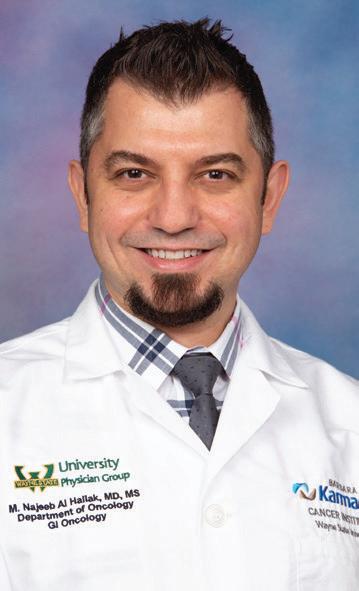
Multidisciplinary Teams at Karmanos. “Our particular clinical trial is very much targeted to that mutation.
“She was concerned about enrolling in the trial but realized it was her best option. She followed the science and made a courageous decision to enroll.”
“Enrolling in the trial was exciting but also scary,” Janosko admitted. “Dr. Al-Hallak said that although he hadn’t previously had a pancreatic cancer patient take this drug, he felt I was a great candidate.”
Cathleen and John make the four-and-a-half-hour trip every two weeks to Karmanos’ Detroit location, where
she receives the experimental drug intravenously. She will finish the treatment in late 2023.
Janosko’s decision paid off tremendously. In February 2022, a positron emission tomography (PET) scan showed no visible tumors. The latest updated CT scan from October 2022 confirmed that her cancer is still in remission with no measurable tumors or metastatic disease. Janosko said she had not experienced side effects from the treatment.
“Her case is nothing short of amazing,” Dr. Al-Hallak said. “Scans show no visible cancer and Cathleen is in remission. She’ll continue receiving the drug through the two-year clinical trial period. I truly believe her case will have a very positive outcome.”
Dr. Al-Hallak added that the tumor genetic data opened further treatment possibilities for Janosko when none seemed readily available.
“For any cancer, patients should speak with their oncologist about getting a detailed genetic report of their tumor. Ask your doctor if those results might make you a good candidate for a clinical trial. It could save your life,” he advised.
Janosko also encourages other cancer patients to consider enrolling in a clinical trial.
“My results are nothing less than a miracle,” she said. “Dr. Al-Hallak and his team at Karmanos have always treated us with the best care.
“The ongoing cancer research gives me hope that doctors will be able to find more drugs that work for different cancers. Clinical trials are important because they help determine what works. Look for a medical team that addresses your specific cancer and doesn’t treat you like every other patient. My treatment was tailored to me, which has made all the difference.”
If you or someone you love has received a cancer diagnosis, it is important to seek an evaluation from cancer experts before beginning treatment. Call 1-800-KARMANOS (1-800-527-6266) to speak with a trusted oncology patient navigator or visit karmanos.org for more information.
Najeeb Al-Hallak, M.D., M.S.
Karmanos Cancer Institute 5
KARMANOS CANCER INSTITUTE OPENS ROSEVILLE MEDICAL ONCOLOGY CLINIC, WELCOMES NEW ONCOLOGIST
The Barbara Ann Karmanos Cancer Institute now sees patients at the new Karmanos Cancer Institute – Roseville. Located at 30550 Utica Road, this cancer center provides medical oncology services to patients in southern Macomb County. As Michigan’s largest cancer care and research provider, the Roseville clinic is Karmanos’ 16th location.
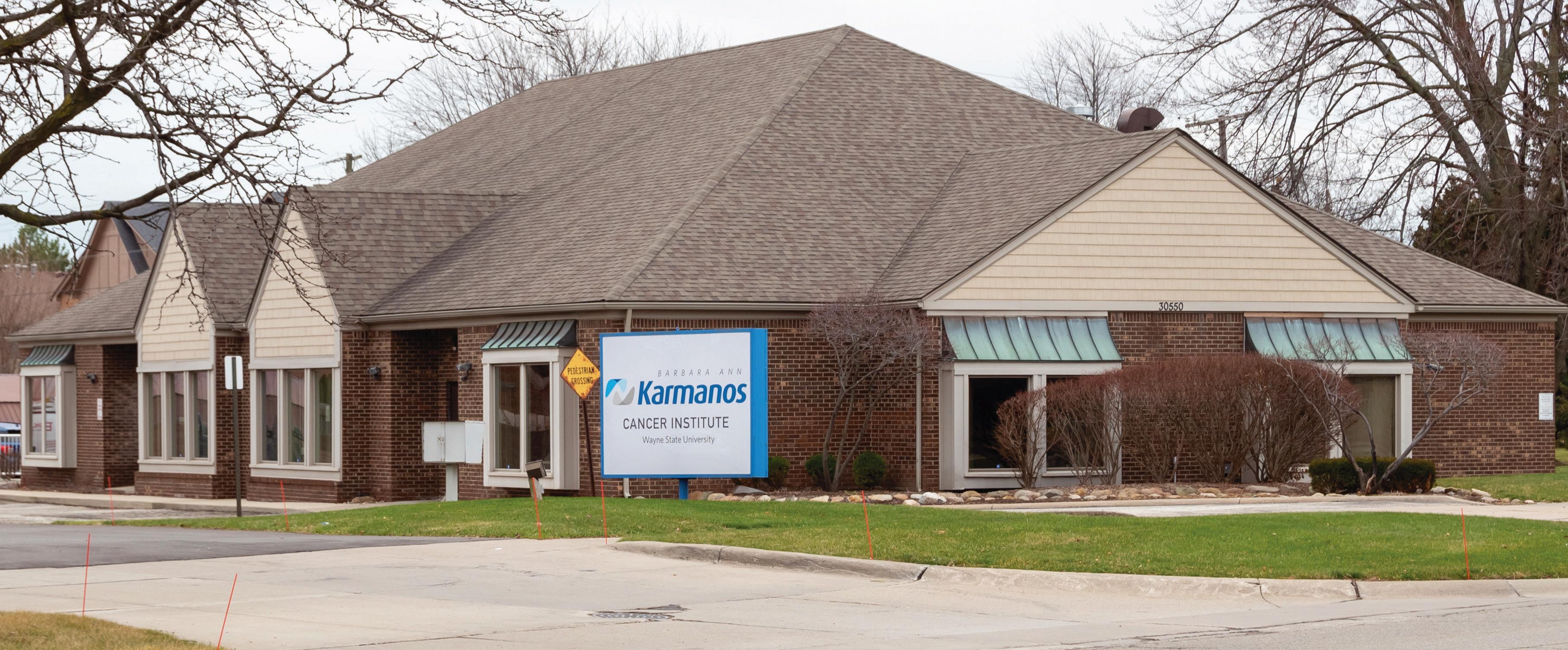
“By extending our comprehensive cancer care to more communities, we are giving more patients access to their best chance to beat cancer,” said Brian Gamble, president of Karmanos Cancer Hospital in Detroit. “Recruiting and retaining the top oncologists and expanding our reach shows our commitment to increasing the availability of our expertise and tomorrow’s promising treatments.”
“The 6,000-square-foot location offers clinical care, infusion and pharmacy services. Soon, patients will be able to receive chemotherapy treatments in the clinic,” Gamble added. “As an extension of our headquarters and home base in Detroit, our specialists work to provide patients their best chance at a favorable outcome.”
Tarik Hadid, M.D., MPH, M.S., FACP, hematologist and medical oncologist, joins Karmanos and primarily sees patients for multiple types of cancer at the Roseville clinic.
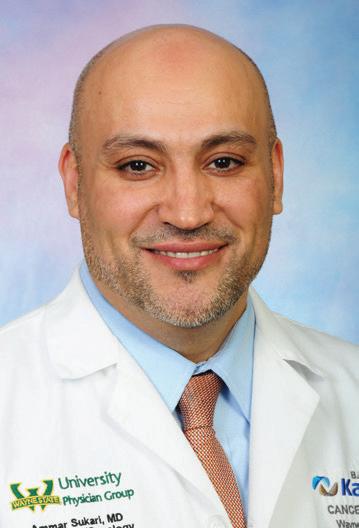
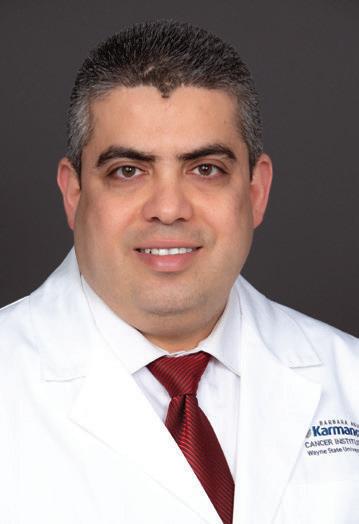
“I am thrilled to join an NCI-designated comprehensive cancer center and provide world-class cancer care to more patients at the new clinic,” said Dr. Hadid. “The level of care that Karmanos delivers is exceptional. I look forward to bringing that same care to Roseville and
surrounding communities. More importantly, our patients can focus on their healing instead of worrying about traveling long distances for the best cancer care.”
Dr. Hadid has over a decade of experience treating multiple cancers, including lung, head and neck, thymic, mesothelioma and esophageal. He is a member of Karmanos’ Head and Neck Oncology, Melanoma, Sarcoma and Thoracic Oncology Multidisciplinary Teams (MDT), headquartered in Detroit. Much of his research focuses on conducting clinical and translational trials to improve treatment strategies for patients with head and neck and lung cancers.
Ammar Sukari, M.D., medical oncologist, leader of the Head and Neck Oncology MDT, and member of the Breast Cancer, Thoracic Oncology and Phase 1 Clinical Trials MDTs, also sees patients at the Roseville clinic. Visit karmanos.org/roseville to learn more.
The new southern Macomb County cancer center is Karmanos’ 16th location.
Ammar Sukari, M.D.
Karmanos Hope, Spring/Summer 2023 6
Tarik Hadid, M.D., MPH, M.S., FACP
THE DESIGNATION THAT MAKES A DIFFERENCE
Karmanos Cancer Institute is the only National Cancer Institute (NCI)-designated comprehensive cancer center in Metro Detroit and one of just 53 centers of its kind in the United States. To receive this designation, a hospital must demonstrate expertise in laboratory, clinical and population-based research. Hospitals must also provide early-phase clinical trials and conduct community outreach and educational activities. This means patients can access treatments exclusive to Karmanos, cancer prevention programs, and multidisciplinary teams of cancer specialists — a comprehensive approach you cannot find at a community hospital.
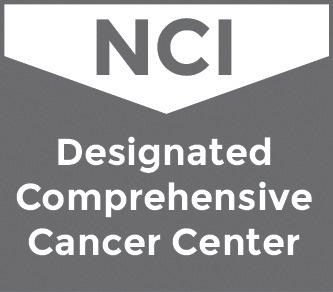
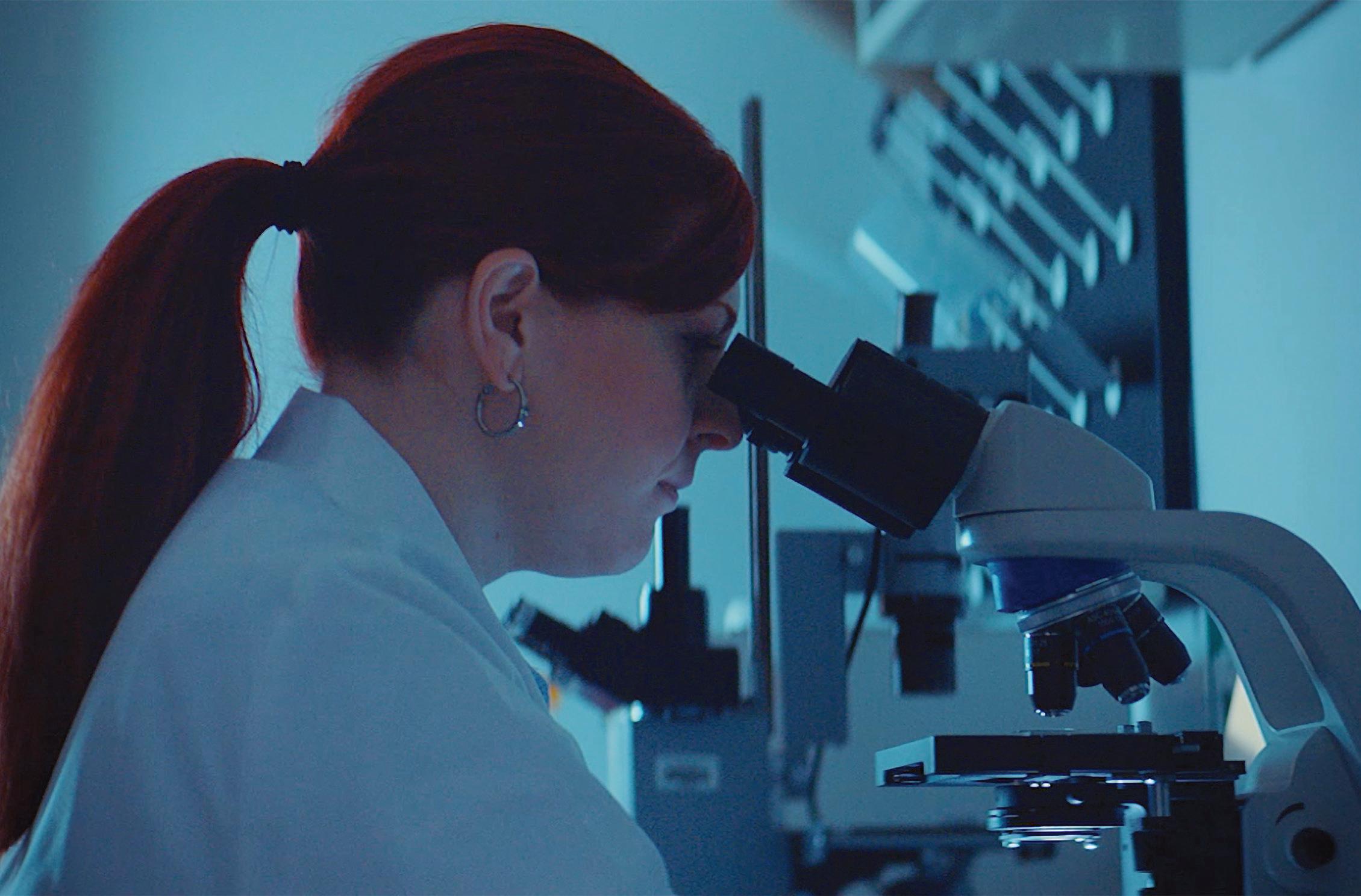
Karmanos Cancer Institute 7
THE UNCANNY SYMPTOMS THAT LED TO A DETROIT
From perceived invincibility to sensibility, hope and inspiration, Paris Jones has
In 2019, at 40 years old, Paris Jones was healthy, active and thriving as a metro Detroit-based filmmaker. He exercised daily and ate a nutritious diet, so he attributed his recurring back pain to rigorous workouts and basketball games. “The pain would come and go, and I thought I would just tough it out,” he said. “I wasn’t really a person who went to the doctor for any reason. I was terrified to see a doctor because I was afraid of hearing something was wrong.”
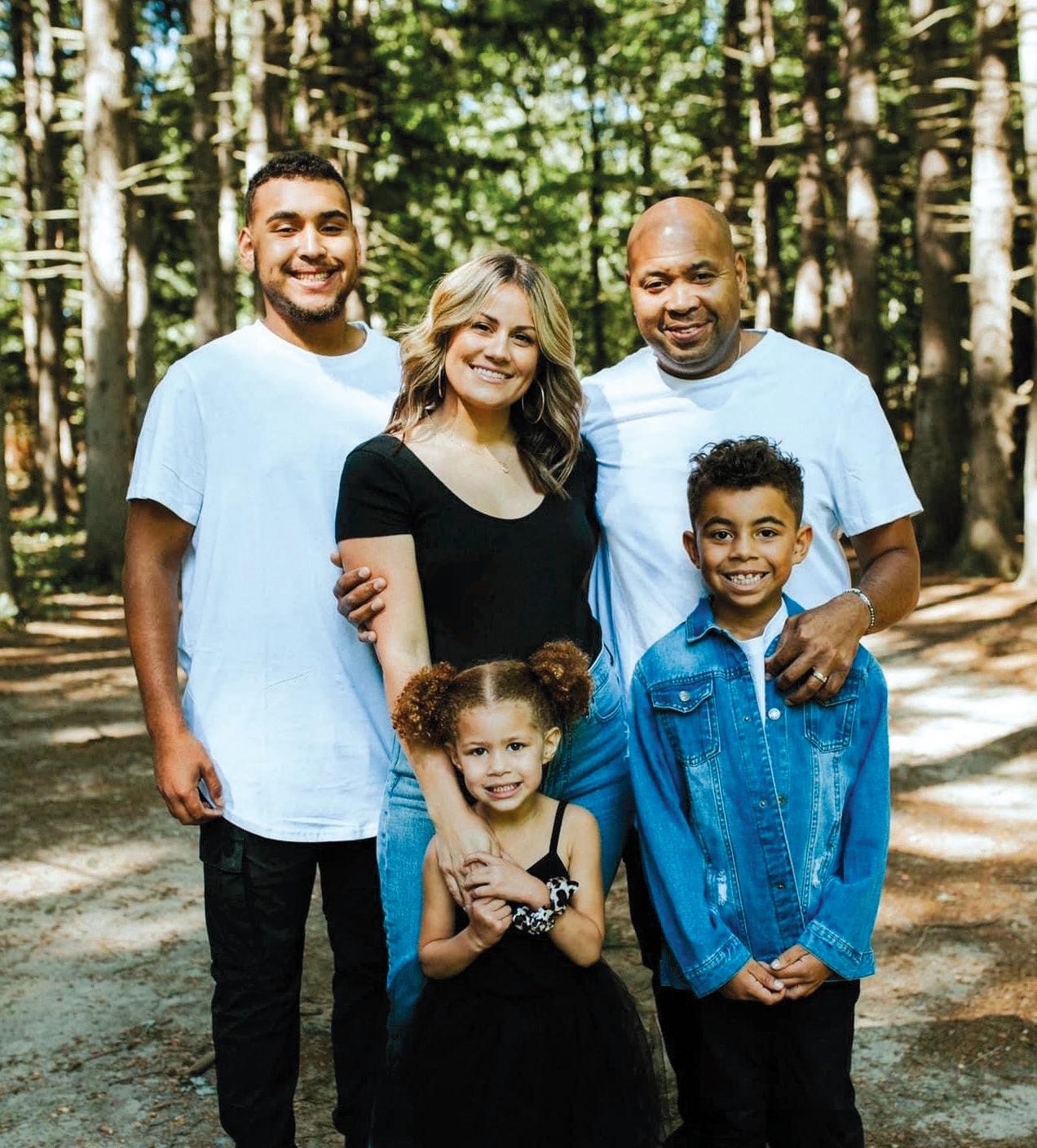
In July of that year, Jones went to a local emergency room because he developed pneumonia. While there, he discussed his back pain with the ER doctor, who ordered an X-ray. Jones said he was given pain medication for his back and treated for pneumonia. He recovered from pneumonia and started feeling better, but the back pain persisted.
Around the end of summer that year, the pain had worsened, but he did not seek further medical attention. At the time, Jones did not have a primary care physician.
Not only did Jones continue to “tough it out” through severe pain, but he also continued working through it. That fall, Jones had a business and family trip to California, Arizona and back to Michigan. Jones went to Los Angeles (LA) ahead of his family, which included his wife, Alison, and their three children. While there, he experienced scary symptoms but did not see a doctor.
“I sneezed, and my back shattered. The sneeze popped my spine and a few bones broke. I couldn’t walk. I was frozen!” Jones exclaimed. “After a while, I could move a few inches but couldn’t walk.”
Jones said he also started to experience bleeding from his mouth and nose. He even awoke one morning to find his sheets covered in blood. He painstakingly kept his symptoms from his family, who had joined him in LA by then.
“I didn’t want to freak anybody out,” he explained.
Through all of this, Jones still did not go to a doctor. He even had to use canes and wheelchairs during a family trip to Disneyland.
After a week, he started his drive back to Michigan, with a stop in Arizona, all the while in pain and unable to walk freely without support. After the day-and-a-half drive from Arizona, Jones returned home. Upon seeing his condition, Alison, who had returned home with their children earlier, and her mom immediately rushed Jones to a local hospital emergency room.
“My lungs were failing. I was in kidney failure. I had to have a blood transfusion,” Jones said. “Within 20 minutes of running tests, a doctor came back and told me, ‘You have cancer.’ At that moment, all I could think was, ‘how long do I have?’ I couldn’t believe this was happening!”
Jones learned his cancer was very aggressive. He was diagnosed with multiple myeloma. He chose to seek treatment at the Barbara Ann Karmanos Cancer Institute in Detroit.
Multiple myeloma: What is it and who develops it?
Multiple myeloma is a form of blood cancer.
“Specifically, plasma cells become cancerous in the bone marrow,” explained Jeffrey Zonder, M.D., hematologist and medical oncologist, leader of the Multiple Myeloma and Amyloidosis Multidisciplinary Team (MDT) and member of the Hematology Oncology MDT at Karmanos. Dr. Zonder is also part of the team who treated Paris Jones.
“As those cancerous cells overgrow, it can cause problems in the bone marrow and other symptoms in the body,” Dr. Zonder explained. “These symptoms include unexplained anemia, improper kidney function and persistent back pain.” Multiple myeloma is the second most common blood cancer and becomes more common as people age. It is more frequently diagnosed in men, and African Americans have twice the risk of developing multiple myeloma in their lifetime than White Americans. According to Dr. Zonder, the root cause for this increased risk has not been determined, but a great deal of work is being done to learn more.
Jones’ multiple myeloma treatment journey
Later that year, Jones began his treatment. He underwent chemotherapy for a year and a half and eventually had a bone marrow transplant.
“The preparation process for the stem cell transplant was emotionally and physically challenging,” he said. “A lot of tests, shots, medication, and meetings.”
Paris, his wife Alison and their three children.
Karmanos Hope, Spring/Summer 2023 8
“I thought I was invincible.”
The chemotherapy treatment and transplant took a toll on Jones’ body. The myeloma had caused a lot of bone damage, which affected his mobility and made it harder for him to tolerate some parts of his therapy.
“That limited me from working a lot and doing my normal activities,” he explained.
“The specific chemotherapy agents Jones has been treated with are standard of care for myeloma patients, but certain aspects of the regimen needed to be modified, given the health issues he was already facing from the outset,” explained Dr. Zonder.
Jones is grateful for the care he received at Karmanos. He credits Karmanos physicians and care teams as part of the support system that saw him and his family through the roughest times of his treatment. Jones is currently on maintenance therapy and takes a daily chemotherapy pill to control his multiple myeloma. “Newer myeloma therapies are always being studied. If Paris’ current treatment starts becoming less effective, his options would likely include either other standard or newer agents only available through clinical trials.
“There really is no formal recommended screening test for multiple myeloma, and there are no specific measures that one can take to prevent myeloma.” Dr. Zonder continued. He advises that seeing a primary care physician for regular physical exams, including periodic lab work, can be a powerful tool in identifying and addressing any unexpected health issues.
Seeing a primary care physician routinely is a message Jones now shares with anyone who will listen.
Getting the message out: A story of survival that defies the odds
These words could be the opening lines of the trailer for Jones’ upcoming documentary about his journey with
multiple myeloma. His documentary is in the final stages of production. He details the process that set him and his family on the path to informing and inspiring others in this film. Jones hopes to have the documentary featured at several film festivals, spreading his message across the country and the world.
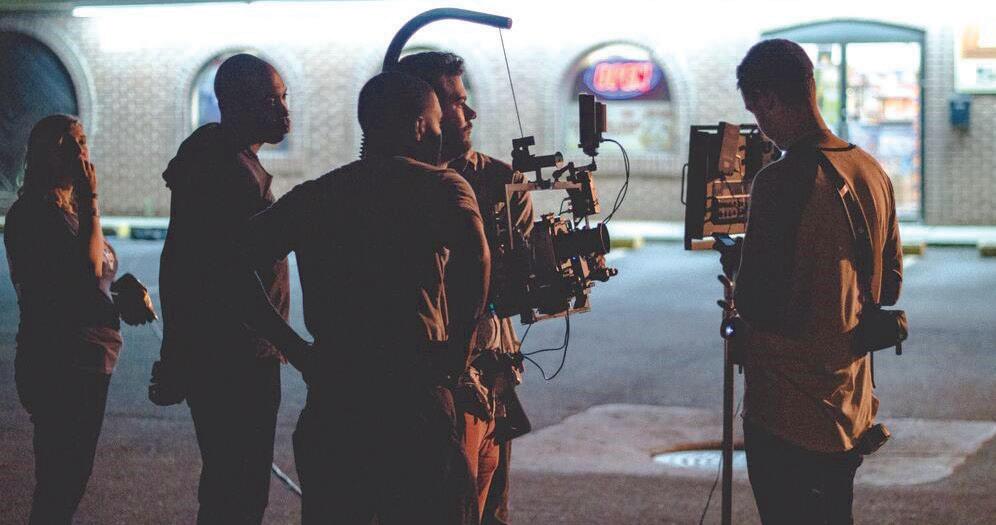
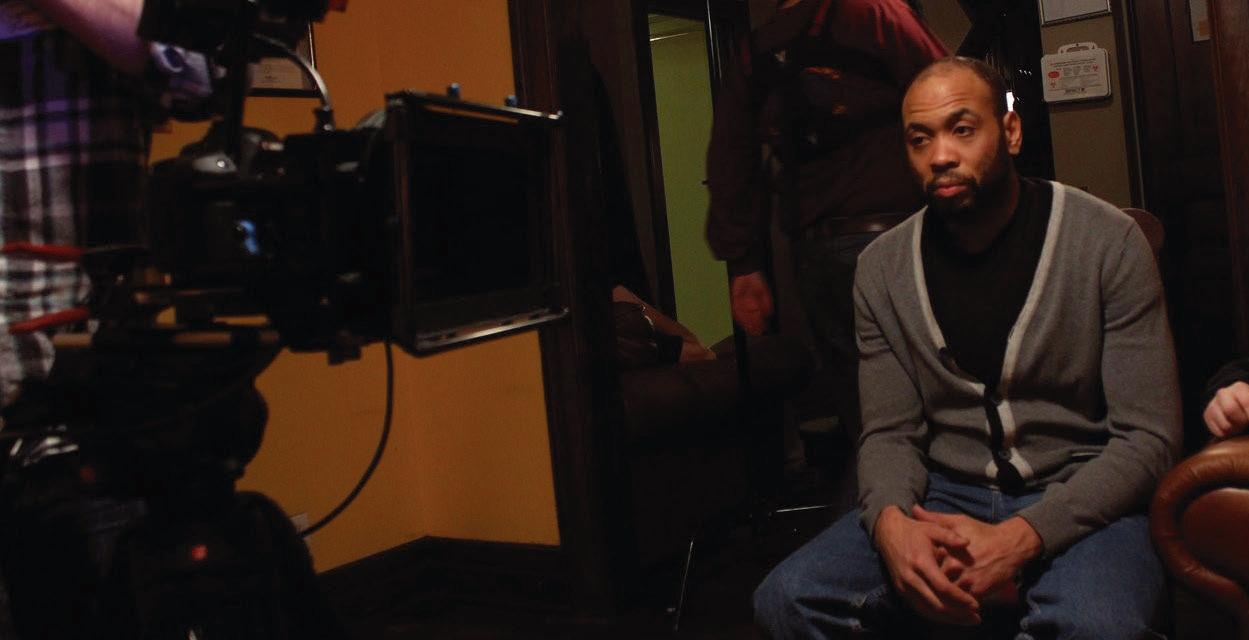
Alison is also spreading awareness about multiple myeloma and messages of hope. She runs the family business, an online apparel and merchandise brand bearing inspirational and encouraging messages and quotes with Paris’ mantra, ‘I’m just happy to be alive.’ Alison started the business just months after Jones’ diagnosis.
“I started the business to supplement Paris’ income while he couldn’t work. When Paris came home from the hospital, he wasn’t able to do anything for himself, and I had to take a month off work to care for him,” Alison explained. She said family and friends supported them in many ways, including purchasing merchandise. Today, she wants their uplifting messages to give others hope through any hard times they are experiencing.
“That’s how my brain works. How can we turn this into a positive? We will use this very unfortunate diagnosis to help our family and help others.”
Jones knows his story could have had a very different outcome. After his shocking diagnosis, going through treatment that included daily chemotherapy and eventually a bone marrow transplant, he is grateful to be able to tell his story. He wants to inform and educate as many people as he can.
“I know I’m still here for a reason,” Jones said. “My message extends to everyone, transcending race and gender, but I want to open the eyes of young men, especially young African American men. You can take all the right steps, and it can still happen to you.”
FILMMAKER’S MULTIPLE MYELOMA DIAGNOSIS
a message about multiple myeloma he wants young men to hear
Paris sitting behind the scenes during the filming of a TV show pilot.
Karmanos Cancer Institute 9
A behind the scenes look at one of Paris’ short films.
Breast cancer survivor credits early mammogram for saving her life
In August 2021, Kelly Klamer knew she had to make an appointment for her mammogram, but she kept putting it off.
Klamer’s mother is a breast cancer survivor and was 48 years old when she was diagnosed. She knew children of breast cancer survivors should start their mammograms 10 years before their mother was diagnosed, but she figured she had more time.
That all changed when the Bay City woman ran across a woman talking about her first mammogram on TikTok.
“I hit the follow button,” said Klamer, now 39. “Little did I know that would change my life.”
One day the woman shared that a spot was found on her mammogram and she had to have an ultrasound and a biopsy. She shared a conversation with her nurse emphasizing the earlier cancer is caught, the higher the survival rate. Klamer made an appointment for her first mammogram the next day.
“Between August and November 2021, I ended up having two mammograms, an ultrasound and a biopsy,” explained Klamer. “This all led to the dreaded phone call informing me that I had breast cancer. Things happened fast. Ultimately, I decided to have a bilateral mastectomy, with reconstruction.”
Since Klamer often deals with difficult situations humorously, she decided to name her tumor Earl. She is a fan of the Dixie Chicks and their song, ‘Goodbye Earl.’
“Naming my tumor gave me a song to sing if I was feeling anxious or nervous,” Klamer explained. “I’m proud to say that I got my doctor and nurse to call my tumor Earl.”
The Friday before her surgery, Klamer threw a ‘Goodbye Earl’ party.
After Klamer’s surgery, she decided to figure out what her life would be like after her cancer treatments.
“With my newfound confidence that I did not want to go away, I made a list of things I wanted to do,” said
Klamer. “These things included riding a horse, ziplining, skydiving, and sharing my story to inspire others to get their mammograms.”
But the first thing she wanted to do was get her ears pierced.
“At 38 years old, I never pierced my ears,” said Klamer. “I wasn’t a fan of needles, but considering what I just went through, this would be a piece of cake. I knew hair loss from chemotherapy would be hard on me, but with some new fancy earrings, at least I could concentrate on that instead of my missing hair.”
While Klamer considers herself lucky to have only minimal side effects with chemotherapy, a battle she had to deal with was depression. She found a therapist who helped her sort through her feelings and emotions. She also found healthy ways to cope, like journaling and creating a wall with photos of people, pets and things that meant a lot to her.
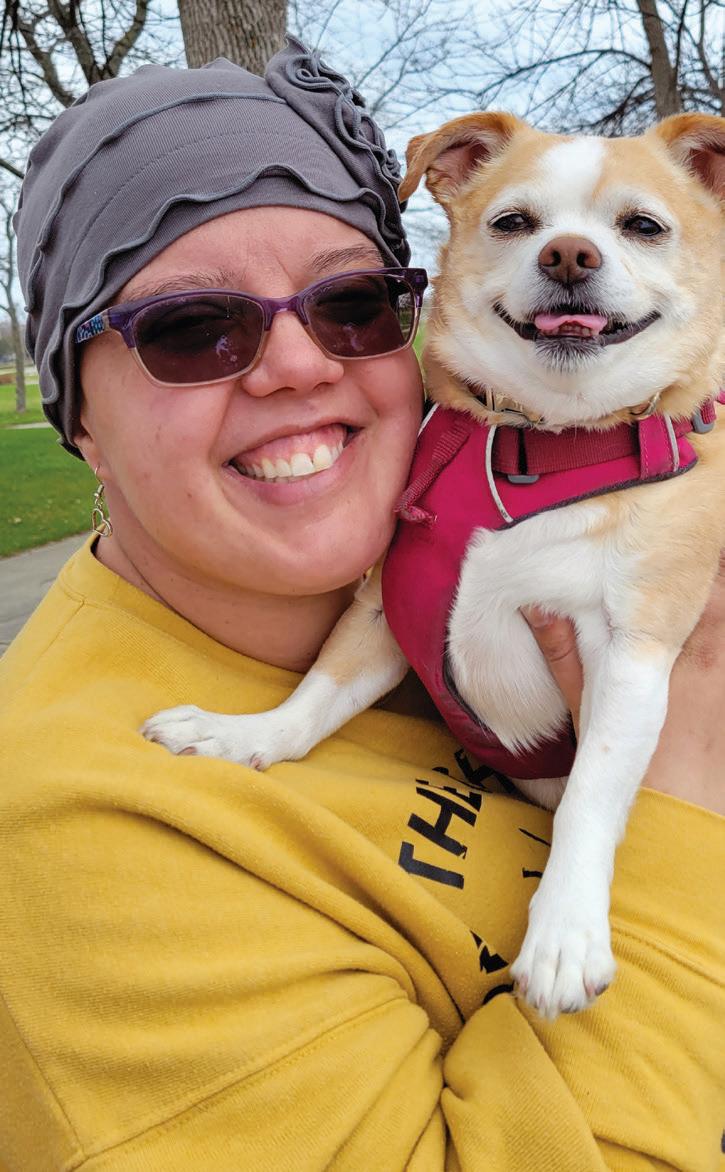
In May 2022, Karmanos and McLaren invited Klamer to be honored during the 10th Annual Pink Out the Park event with the Detroit Tigers at Comerica Park. She traveled to Detroit in a limousine with her family and closest friends. Paws, the Tigers mascot, gifted Klamer a pink bat live on the stadium’s scoreboard.
On June 9, 2022, Klamer finished chemotherapy at Karmanos Cancer Institute at McLaren Bay Region and finished radiation treatments that August.
“I was so excited to ring the big sailor bell everyone rings when they have completed their treatments,” said Klamer. “It was a great way to celebrate.”
Ashley Richardson, D.O., was Klamer’s breast surgical oncologist at McLaren Flint Comprehensive Breast Care.
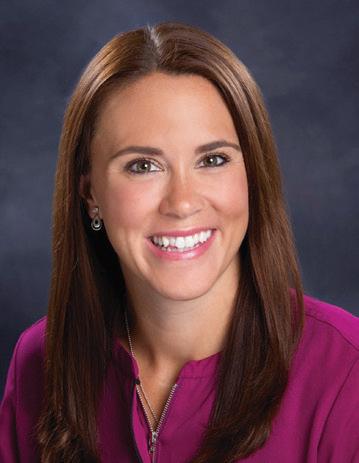
“Kelly has an amazing, uplifting spirit,” said Dr. Richardson. “Her upbeat attitude and positive outlook helped her immensely throughout her cancer journey.”
Klamer is currently continuing her career as a medical records clerk at McLaren Bay Region. She said her journey is far from over.
“I have so much more that I want to do and discover,” said Klamer. “I want to keep pushing my limits.”
Find the nearest location for mammography screening at karmanos.org/screeningandprevention.
Kelly and her dog Lucy spending some time at the Riverwalk in Bay City.
Ashley Richardson, D.O.
“I have so much more that I want to do and discover.”
Karmanos Hope, Spring/Summer 2023 10
Should you be screened for cancer?
Women ages 40+
Women should begin having annual mammograms at age 40 or earlier if you have a family history of cancer.
Are you a smoker?
If you are a current or former smoker age 50-80 with at least 20-pack/year smoking history, you should consider screening.
MAMMOGRAPHY LUNG CANCER SCREENING
People ages 21-65
Certain risk factors increase the risk of getting cervical cancer like family history, smoking, medical history and long-term use of contraceptives.
People ages 45+
Begin screening at age 45 and continue every 10 years. Those at an increased risk should screen sooner and more often.
CERVICAL CANCER SCREENING
COLORECTAL CANCER SCREENING
Do you have a family history of cancer?
The Cancer Genetic Counseling Service helps determine cancer risk. This service is helpful to anyone who has anxiety and/or concern about their risk of cancer due to several relatives with the same or related cancers, a personal/family history of a rare or unusual cancer, a relative with more than one type of cancer or a personal/family history of cancer under the age of 50.
For more information and to schedule your appointment, call 1-800-KARMANOS, scan the QR code to the right or visit Karmanos.org/cancerscreening
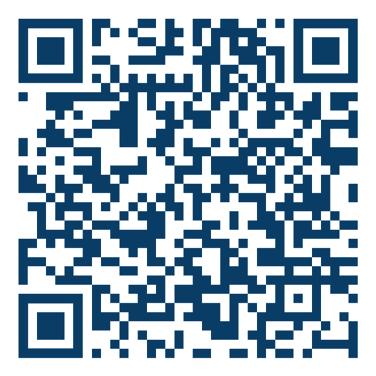
SCREENING
& PREVENTION PROGRAM AT KARMANOS
Karmanos Cancer Institute 11
UPCOMING KARMANOS EVENTS
SEPTEMBER
08 13th Annual All Cancer Symposium
Location: In-person and Virtual
Visit karmanos.org/cancersymposium to register.
10 Pediatric Cancer Awareness Day with the Detroit Tigers
Location: Comerica Park, Detroit
Visit tigers.com/tickets.
21 Free Prostate Cancer Screening
Location: Bay City
Call 1-877-411-2726 to register.
28 Health Equity Book Club
Location: Virtual
Visit karmanos.org/bookclub to register.
OCTOBER
07 Screening Saves Screening and Prevention Event Location: Detroit
Visit karmanos.org for more information.
19 Free Breast Cancer Screening Location: Bay City
Call 1-877-411-2726 to register.
TBA Hockey Fights Cancer with the Flint Firebirds Location: Flint
Visit mclaren.org/flintfoundation for updates.
The list above does not include all planned events. Please visit karmanos.org/karmanosevents for updates.
Looking for ways to cope with cancer? Karmanos offers general and specific cancer support groups (for patients, survivors, their family, friends and caregivers), art and music therapy sessions, yoga, tai chi, meditation sessions, and more! Visit karmanos.org to view the patient and support services available.
Karmanos Hope, Spring/Summer 2023 12
Spouse of 33-year-old lung cancer survivor advocates for early detection and awareness
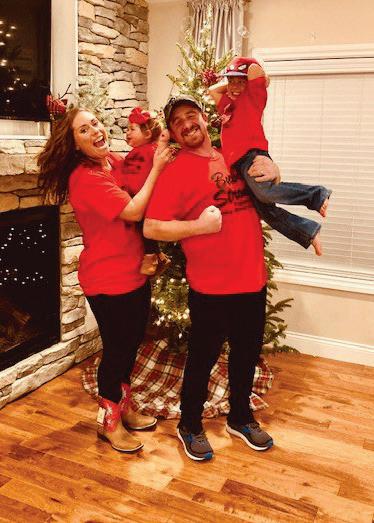
When Andy arrived at the McLaren Greater Lansing Emergency Department in December, a chest X-ray showed what was thought to be pneumonia. The scan showed a shadow that covered roughly 40% of his lung. He was sent home with antibiotics, but after one week, his symptoms worsened. Andy returned to the emergency department.
“After several hours, numerous lab draws, and other scans, Andy’s chest X-ray showed no improvements from the prior week,” said Cassandra.
Andy was admitted for additional testing, including an endobronchial ultrasound (EBUS) bronchoscopy procedure that looks for different types of lung disorders, including inflammation, infections, and cancer. What happened next was seemingly impossible for a 33-year-old nonsmoker.
It was November 2020 when Andy Wise developed a cough and shortness of breath. He started suffering from daily headaches and a lack of energy. It was the peak of the COVID-19 global pandemic, and Wise thought that he may have contracted the coronavirus.
As the days went on, Wise’s wife, Cassandra, became concerned. He wasn’t getting better, and in fact, tasks he normally had no problem doing, like carrying 50-pound bags of feed for their animals, he was struggling to complete. A few weeks later, things took a turn for the worse and Cassandra knew something was wrong.
“His headaches now required Motrin and Andy never took pain medication,” said Cassandra. “We were worried and it wasn’t clear if this was COVID. After several trips to urgent care, every COVID test came back negative, and I had to do a lot of convincing for Andy to go to the emergency room.”
“Dr. Salah Aboubakr placed his hand on mine and said, ‘This is not good, and nothing like what I thought it would be.’ He was terribly sorry; I saw his eyes fill with tears, and he expressed to me that it appeared that Andy had at least stage III, if not stage IV, lung cancer,” said Cassandra. “My chest got heavy. I took a deep breath and knew I had to be strong, because no matter what, we had two young kids that needed us, along with Andy that needed me most.”
When Wise was out of recovery, Cassandra shared the news with him. At this point, it wasn’t clear if his specific cancer was non-small-cell adenocarcinoma or small-cell adenocarcinoma. If the diagnosis was small-cell adenocarcinoma, he could be facing a bleak prognosis of just a few weeks.
“We held each other tighter than we ever had before. We prayed together — something we never did before — and couldn’t put any right words beyond, ‘I love you forever,’” said Cassandra. “I couldn’t handle
Andy (right), his wife Cassandra (left) and their two children.
Karmanos Cancer Institute 13
“We want others around us to know the white ribbon symbolizes many things but most importantly means we are not in this alone.”
the thought of Andy being gone. We would fight with everything we had, including our friends, family, entire community, medical staff and people we didn’t even know.”
The next few weeks were a blur of doctor appointments. Wise was diagnosed with stage IV non-small cell adenocarcinoma. This meant his cancer had spread to other parts of his body, including his brain. He went to the Karmanos Cancer Institute at McLaren Greater Lansing for treatment. Amit Bhatt, M.D., Ph.D., radiation oncologist, and Daniel Isaac, D.O., MS, hematologist and medical oncologist, determined the best course of action was to begin brain radiation. At the same time, they waited for a blood biopsy result to see if Wise had a genetic mutation that would indicate a lung cell disorder causing the cells to grow abnormally. The biopsy indicated Andy had the anaplastic lymphoma kinase positive (ALK+) mutation, and he started tyrosine kinase inhibitors (TKI) therapy, a type of targeted therapy.
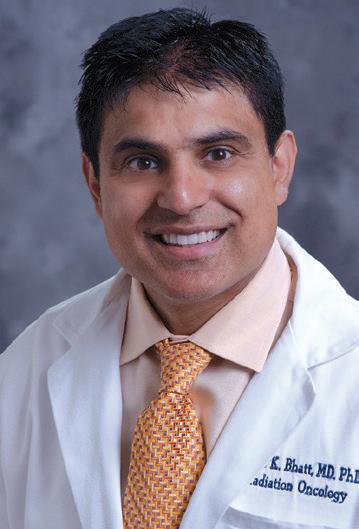
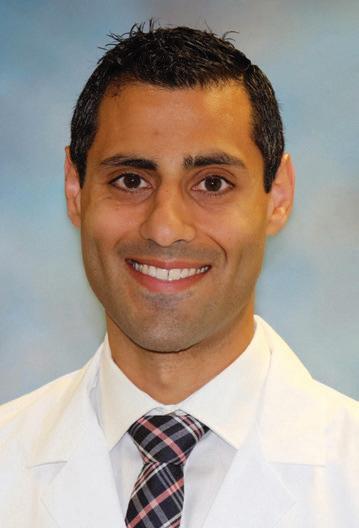
“No matter what tomorrow brings, he has had 22 additional months to see our children start kindergarten and preschool,” said Cassandra. “We do not put vacations on hold like we would have in the past; we focus our daily lives on living and laughing to redirect what is important in life.”
As Wise’s primary caregiver, Cassandra has learned to be stronger than ever before. She and Wise had to navigate difficult conversations with their two children, who were 13 months and three years old when Wise was diagnosed.
“We still receive cards to boost our hopes and simply to let us know our friends and family care,” said Cassandra. “Knowing we have an entire community cheering us on makes being a caregiver much easier.”
Wise’s wife is also now an advocate for lung cancer awareness. She is involved in the White Ribbon Project, co-founded by Heidi and Pierre Onda. The first ribbon was created in fall 2020, when Pierre created one for Heidi to hang on their front door to symbolize unity and “You are not alone.” It is a symbol of increasing public awareness, sparking conversations, creating a sense of community, and, amplifying the message that lung cancer awareness must include early detection, treatment, research and survivorship.
“It was a nightmare working with insurance. I never knew there were ‘specialty pharmacies’ and it would take time for the medication to be overnighted,” said Cassandra. “Thank goodness for the nurse navigators who guided me through the process and gave me a heads-up that there might be challenges, but there were also solutions.”
Becky Loomis, lung cancer nurse navigator, along with others, helped Cassandra work through the assistance programs, and Wise was successfully able to start his initial line of treatment.
Since his diagnosis, Wise has had progression, gone through brain surgery, and switched to a couple of different therapies. More importantly, he is truly reminding himself to live each day to its fullest.
“Andy and I want to make an impact,” said Cassandra. “We both did not know anyone could get lung cancer, whether you smoked or never had a cigarette in your entire life. We want others around us to know the white ribbon symbolizes many things but most importantly means we are not in this alone.”
Karmanos and McLaren offer a lung cancer screening program for people who are at high-risk of developing the disease. Visit karmanos.org/lungcancerscreening to learn more and to find a location near you.
Karmanos Hope, Spring/Summer 2023 14
Amit Bhatt, M.D., Ph.D. Daniel Isaac, D.O., MS
How Instagram inspired this ovarian cancer
survivor to start a nationwide support group
Unfortunately, her debulking surgery required the removal of both her ovaries, fallopian tubes and her uterus. Following surgery, Ianitelli went through chemotherapy at Karmanos. Due to her tumor type, she qualified for a chemotherapy maintenance trial. She started the clinical trial in January 2020 and finished the treatment portion in February 2022.
Ianitelli continues to visit Karmanos’ Detroit location for follow-up care. As of December 2022, she has remained in remission from her cancer. Her follow-up appointments are conveniently located, as she is a nurse across the street at the Children’s Hospital.
“There have been times when my labs were off, and I would get my labs drawn on my lunch break,” said Ianitelli.
Having to witness a relative receive a cancer diagnosis and go through treatment can be a wake-up call. For some, their mind may shift to a prevention mode to avoid hearing a diagnosis of their own in the future.
Sara Ianitelli’s plan was simple after her mom was diagnosed with breast cancer at 33.
“My whole life, I had a plan,” the Macomb resident explained. “I was 100% ready for breast cancer.”
Her plan led her to the Women’s Wellness Clinic at Karmanos Cancer Center in Detroit for routine mammograms. However, it was not a breast cancer diagnosis that Ianitelli would have to face.
Ovarian cancer: Two words she didn’t expect to hear.
During a checkup in 2018 to ensure her intrauterine device (IUD) was positioned correctly, her gynecologist noticed a cyst on her ovary. Her physician wanted to monitor the cyst every six months in case of any changes.
A year later, in June 2019, there was a change. Ianitelli’s gynecologist referred her to Ira Winer, M.D., Ph.D., FACOG, gynecologic oncologist, member of the Gynecologic Oncology and Phase 1 Clinical Trials Multidisciplinary Teams at Karmanos. At 34 years old, Ianitelli was diagnosed with stage III clear cell high-grade ovarian cancer. Dr. Winer recommended surgery.
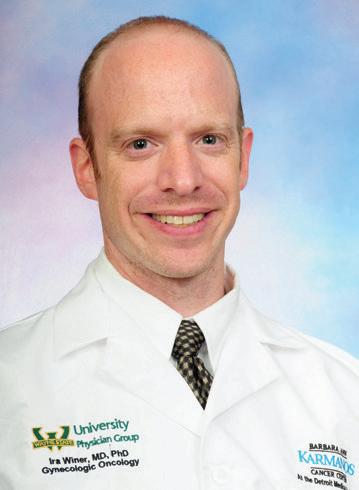
The relationships she has fostered with the staff at Karmanos during her lunch break appointments are not the only way her diagnosis changed her life. Being young and knowledgeable about her risk of breast cancer, Ianitelli suddenly had to learn about ovarian cancer.
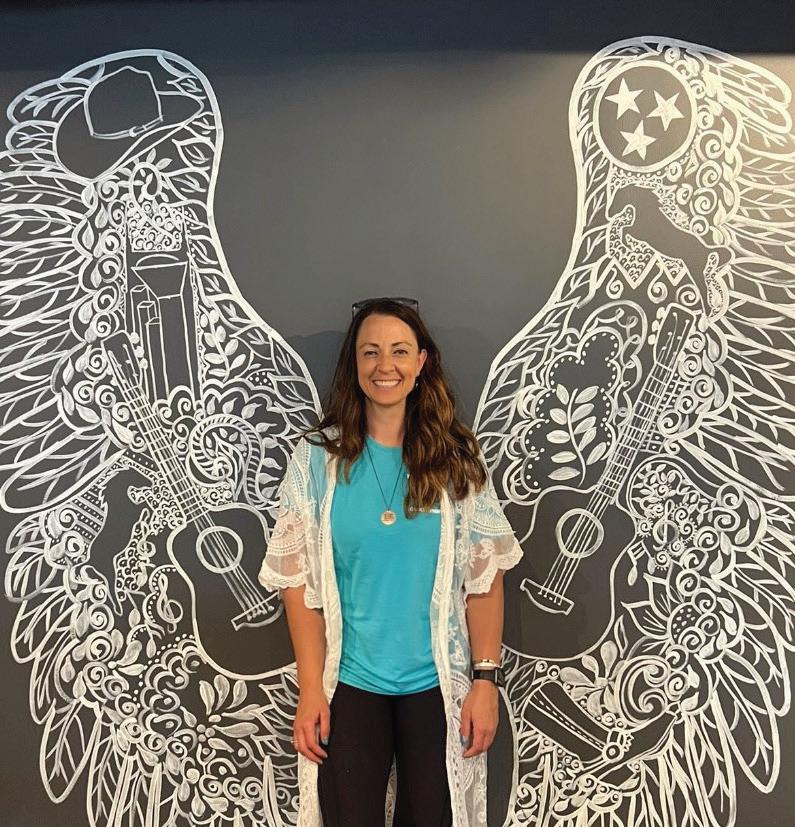
“I didn’t know anything else — nothing about statistics or any of it. I was totally prepared for breast cancer,” said Ianitelli.
While researching ovarian cancer, she fell into a dark hole of information. She realized it was uncommon for women her age to get this diagnosis.
“A lot of the young women that get ovarian cancer would typically have more of an inheritable risk for that specific type of tumor,” said Dr. Winer. “But Sara had genetic testing completed, which came back negative and showed that she did not have anything that put her at an increased risk for this specific type of cancer.”
According to Dr. Winer, it is common for young women with this type of cancer to have a history of endometriosis,
Sara during the recent retreat to Nashville with the Young Ovarian Cancer Women Instagram Group.
Seeking a listening ear, one ovarian cancer survivor unexpectedly creates a virtual network of women supporting each other while fighting cancer.
Karmanos Cancer Institute 15
Ira Winer, M.D., Ph.D., FACOG
which can also increase their risk of ovarian cancer. Though she was never diagnosed with endometriosis, Ianitelli said she experienced heavy periods and severe cramping her whole life.
How Instagram brought a different experience to her cancer journey

Going through any cancer diagnosis can be challenging, which is why Karmanos offers multiple cancer support groups, counseling services, integrative therapy classes and individual sessions, education and more for patients, their families, friends and caregivers. Ianitelli took advantage of these opportunities, but there was just one thing she felt was missing – a connection with other young women going through the same type of ovarian cancer. Because her diagnosis was rare, she started sharing her cancer journey on social media. Her posts connected her to a flurry of women from across the country. These women are around her age and experiencing similar challenges with cancer.
“Through the first year of diagnosis, I had met some girls through the internet and then around January 2021, we had this giant group chat of 20 of us on my Instagram page,” said Ianitelli.
Soon, the group reached the maximum number of people allowed in a single Instagram group chat. Ianitelli, another cancer survivor from California and many other women diagnosed with ovarian cancer took it to the next level by making an official Instagram page titled “Young Ovarian Cancer Women.” At the end of 2022, the page garnered over 600 followers.
Young Ovarian
Cancer Women serves as a place for young women to learn how to navigate, not only being young adults but being young adults who also must adjust to having cancer.
“It’s a great group where you can throw out questions like, ‘Hey, I have a question about this’ or ‘Hey, has anyone had this done,’” said Ianitelli. “It’s very nice to see our differences, but it’s also nice to learn about how we manage the ups and downs we all go through, challenges that your other friends don’t even know about.”
The group of women usually meet over Zoom, sometimes covering specific topics each time or just hosting sessions to check in on each other. They recently met up for a group retreat in Nashville, allowing them to come together from states across the country.
Ianitelli reminds the women in her group and wants to remind other cancer patients that going through the motions on their journey is normal.
“It’s OK not to be OK. Deal with what you can deal with today.”
She also had some tips on how to stay motivated during treatment.
“I encourage everybody to do some physical activity. Movement helped me so much,” explained Ianitelli. “Working out was something I could do that was my choice. It was something I had control of; something I wanted to do and could control how I wanted to do it.”
She also recommends finding “your” people, whether through the internet or not. Finding people to be your rock can be grounding and uplifting through the process.
Visit the Patients & Support tab at karmanos.org for more information about support services, or contact your nearest Karmanos location.
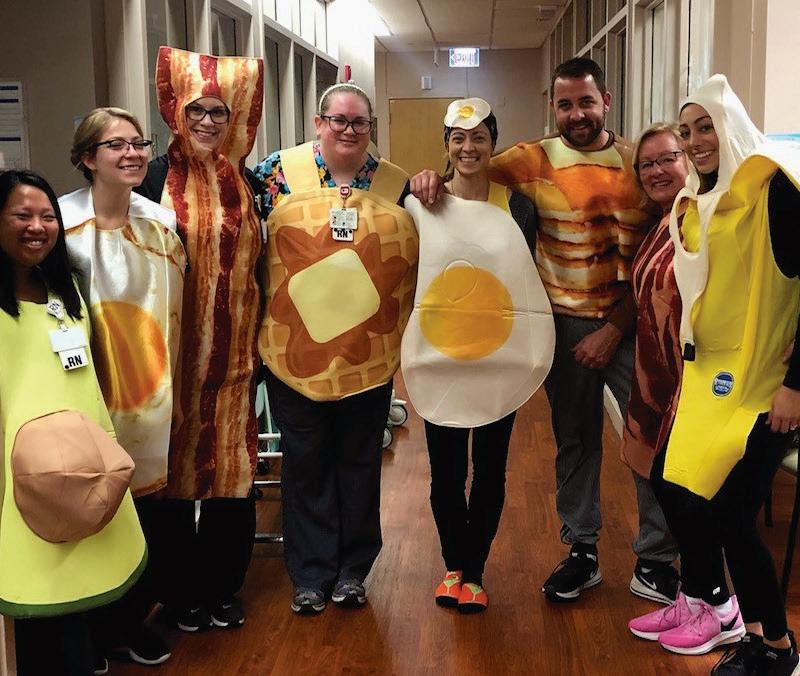 Sara (the sunny-side-up egg in the center), her brother, mom, and her Karmanos care team dressed up on Halloween in 2019.
Sara on her last day of chemotherapy.
Sara (the sunny-side-up egg in the center), her brother, mom, and her Karmanos care team dressed up on Halloween in 2019.
Sara on her last day of chemotherapy.
Karmanos Hope, Spring/Summer 2023 16
“It’s OK not to be OK. Deal with what you can deal with today.”
KARMANOS’ FIRST PROSTATE CANCER PATIENT IN MAUMEE GIVES STAFF A TOKEN OF HIS APPRECIATION
Patient-centered care plays an essential role in anyone’s cancer journey. Individuals travel from all over the country to receive the specialized care offered at Karmanos Cancer Institute. One 66-year-old Whitehouse, Ohio resident lives miles from the newest state-of-the-art cancer care campus that provides outstanding patient-centered care and delivers new life-changing cancer therapies and treatments.
Happel drove by the construction site of Karmanos Cancer Institute at The Toledo Clinic Cancer Center in Maumee almost every day on his way to work as a high school graphic arts teacher at Saint John’s Jesuit High School. At the time, he didn’t know he would become a patient, but, within weeks of his retirement, Happel was diagnosed with prostate cancer without any signs or symptoms.
“When the doctor steps up and says, ‘You have cancer,’ your world stops,” said Happel.
Second to skin cancer, prostate cancer is the most common cancer in American men, affecting roughly one in eight during their lifetime. Just behind lung cancer, prostate cancer is the second leading cause of cancer death in American men. This disease is most curable in its early stages, so routine checkups to monitor prostate health is essential.
Two screening tests help specialists detect prostate cancer early: the prostate-specific antigen (PSA) blood test and the digital rectal exam (DRE). PSA is a particular substance found in the blood produced by the prostate gland. Elevated PSA levels can be a sign of an issue, but it may not always mean prostate cancer. With the DRE, physicians check for suspicious lumps or changes in the prostate. With either of the two tests, a prostate biopsy is needed to confirm the presence of cancer.
After noticing an abnormally high PSA on his routine blood work, Happel’s urologist monitored his levels for another year. In March 2022, his PSA results continued to show an increase, so Happel agreed to a complete prostatectomy (removal of the prostate gland), which was done that same month. During a visit with his
urologist in April, Happel learned the biopsy done shortly after his surgery revealed even higher indications of cancer. His urologist recommended radiation therapy for his next course of treatment.
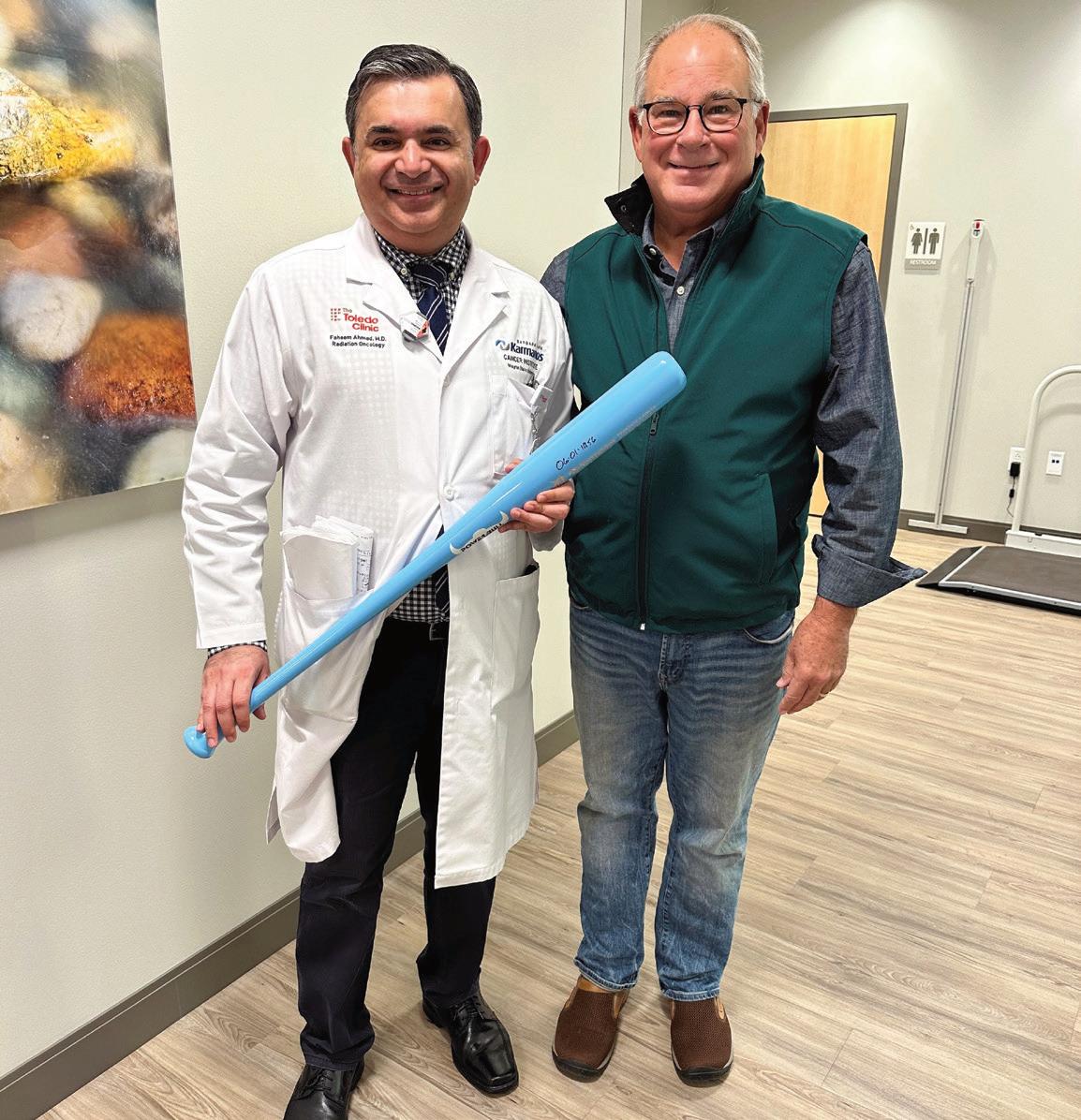
“When I received the news from my urologist that the surgery wasn’t successful, I knew I wasn’t going anywhere else but Karmanos Cancer Institute,” Happel said. “I heard of Karmanos’ reputation as always being a well-organized cancer center with excellent staff that deeply cares for patients.”
His urologist immediately recommended Faheem Ahmad, M.D., radiation oncologist at Karmanos. In the same week, Happel met with Dr. Ahmad. In May 2022, he began his first of 37 rounds of radiation. Every morning at 8 a.m., Happel was warmly greeted by name by every staff member, starting with Mallory at the front desk.
Happel recalled, “Radiation was a very quick and painless procedure where I was in and out in 25 minutes. Dr. Ahmad and his crew did a tremendous job and truly, my life depended on their efforts.”
A symbol of survivorship given by Bill Happel will be displayed at the Ohio cancer center to encourage other prostate cancer patients
Dr. Faheem Ahmad (left) holding the blue bat that Bill (right) gifted to the cancer center.
Karmanos Cancer Institute 17
“The staff was doing so much for me; I wanted to do something for them.”
“Most radiation oncology centers use photon radiation to treat cancer produced in linear accelerators. Utilizing IMRT [intensity-modulated radiation therapy] techniques and cone beam imaging allows us to treat patients safely, accurately and with excellent long-term outcomes,” said Dr. Ahmad.
Being a patient at Karmanos also gives you access to the latest radiation technology and delivery techniques, including IMRT. IMRT is a high-precision radiotherapy technique offered at Karmanos that utilizes sophisticated computer programs to safely deliver high doses of radiation to the tumor or regions within the tumor, while minimizing the amount of radiation delivered to surrounding organs.
Every Friday, Happel would surprise the staff with doughnuts to encourage them, just as they had faithfully inspired him since day one of his radiation treatments.
“The staff was doing so much for me; I wanted to do something for them,” Happel said.
July 13, 2022, was the day Happel and his wife of 32 years had long-anticipated; it was the day that marked his final radiation treatment. After a small ceremony with his supportive team at Karmanos, Happel proudly, with tear-filled eyes, said, “I rang the bell three times and then felt the air go out; I had been holding my breath for the last two years.”
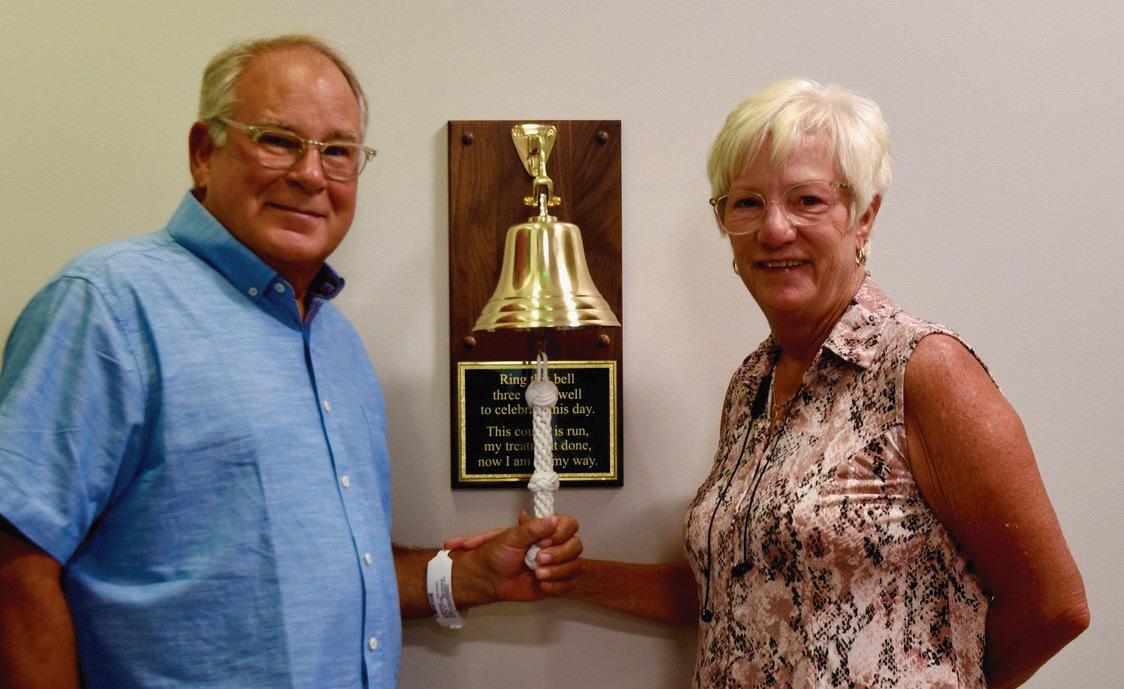
Less than two weeks later, Karmanos and McLaren invited Happel to the second annual Prostate Cancer Awareness Night with the Detroit Tigers on July 25, 2022. Decorated with a blue theme to build awareness for prostate cancer, Comerica Park welcomed hundreds of survivors. That night, he received a blue Detroit Tigers bat symbolizing courage in the face of the battle with prostate cancer. At that time, however, Happel was still unaware of whether the radiation treatments were successful.
Three months after completing his final radiation, Happel met with his urologist. This was the most important test result of his life, and he was aiming for a PSA of zero.
“When the doctor cupped his hand in the shape of a zero was the real moment; I was cancer-free,” Happel described.
After hearing the best news of his life, Happel returned to Karmanos - not for treatment or a follow-up - but he came to give the blue bat he received at the Prostate Cancer Awareness Night to his hero, Dr. Ahmad.

Happel explained, “I told him to have all his patients sign the bat after completing radiation to show hope from one survivor to the next.”
“It was an emotional experience for everyone and such a kind gesture by Bill,” reflected Dr. Ahmad. “He has been a wonderful ambassador for prostate cancer patients and Karmanos. His story is inspirational to our patients. The bat will become a permanent part of our center.”
The first prostate cancer patient at the new Karmanos Cancer Institute in Maumee, Ohio, has a renewed sense of purpose in life and his relationships. After marrying off his son, Happel and his wife plan to take the trip of a lifetime to Ireland to uncover his family history. Before then, Happel plans to return to Karmanos for a visit, where he will be reunited with “the best support system - Dr. Ahmad and his crew at Karmanos Cancer Institute.”
“Our staff goes above and beyond for our cancer patients. We treat them with respect, we answer their questions and concerns, and they become a part of the Karmanos family,” described Dr. Ahmad. “I try to thoroughly explain the meaning of a patient’s diagnosis, treatment options and radiation treatment process. I also tell them they are in charge of their bodies and decision-making. My job is to guide them along with the cancer care team through this journey.”
And the signs of successful treatment kept coming for Happel. He found out after a recent visit with Dr. Ahmad in January 2023 his PSA level still reads zero.
Men nearing age 50 (45 for African Americans) or who have an immediate family member diagnosed with prostate cancer before age 65 should speak with their primary care provider about their risk of developing prostate cancer and if a PSA blood test or DRE is best for them.
Learn more about prostate cancer screening and prevention at karmanos.org/prostatefacts.
Bill (right) gives Paws (left), the Detroit Tigers mascot, dap at the Second Annual Prostate Cancer Awareness Night.
Karmanos Hope, Spring/Summer 2023 18
Bill (left), accompanied by his wife Cathy (right), rings the bell at Karmanos on the last day of his radiation treatments.
THE RIGHT CARE AT THE RIGHT TIME — ALL THE TIME
Choosing the proper care helps save time and money while conserving valuable resources. McLaren has the right care for you.
SERVICE AREA KEY
1 McLaren Bay Region
2 McLaren Bay Special Care
3 McLaren Caro Region
4 McLaren Central Michigan
5 McLaren Clarkston
6 McLaren Flint
7 McLaren Greater Lansing, McLaren Orthopedic Hospital
8 McLaren Health Management Group
9 McLaren Insurance Company, Ltd.
10 McLaren Lapeer Region
11 McLaren Macomb
12 McLaren Northern Michigan
13 McLaren Northern Michigan at Cheboygan
14 McLaren Oakland
15 McLaren Port Huron
16 McLaren Thumb Region
17 Karmanos Cancer Hospital
Karmanos Cancer Institute
McLaren Medical Group
Proton Therapy Center

McLaren Health Plan
OHIO
McLaren Physician Partners
McLaren Medical Group Primary Care
With hundreds of physicians to choose from in our network, visit mclaren.org/welcomeback to find a McLaren Medical Group provider near you.
McLaren Walk-In Clinics
McLaren Now
See a provider through McLarenNow virtual visits anytime, anywhere on your smartphone, tablet, or computer with a webcam. Download the app at mclaren.org/mclarennow
For more urgent conditions (such as accidents, falls, minor burns or injuries, moderate backaches, and sprains, etc.), visit one of McLaren's walk-in clinic locations. Find one near you at mclaren.org/walkinclinics
McLaren Health Care Headquarters
McLaren CareNow Clinics at Walgreens
MDwise (health insurance plans)
McLaren Now+Clinic
McLaren Now+Clinic at select Walgreens offer high quality, efficient, cost-effective care for minor illnesses, injuries and conditions. Find the closest location at mclaren.org/nowclinic.
McLaren Emergency Care
If your condition is emergent, call 9-1-1 or seek care at a dedicated McLaren Emergency Room. Find locations near you or check in to an emergency room online at mclaren.org/ER
Karmanos Cancer Institute 19
4100 John R St. Detroit, MI 48201
1-800-KARMANOS (1-800-527-6266) or visit karmanos.org
Karmanos Cancer Institute is a 501(3) tax-exempt organization. Visit karmanos.org/give for donation information.
PROUD
WORLD-CLASS CANCER CARE CLOSE TO HOME
Our cancer doctors, whether they’re based in Detroit, Northern Ohio or any of our network locations, have met rigorous criteria to become certified as Karmanos providers. This assures patients and their families that they will receive the very best care from Karmanos treatment facilities located at:
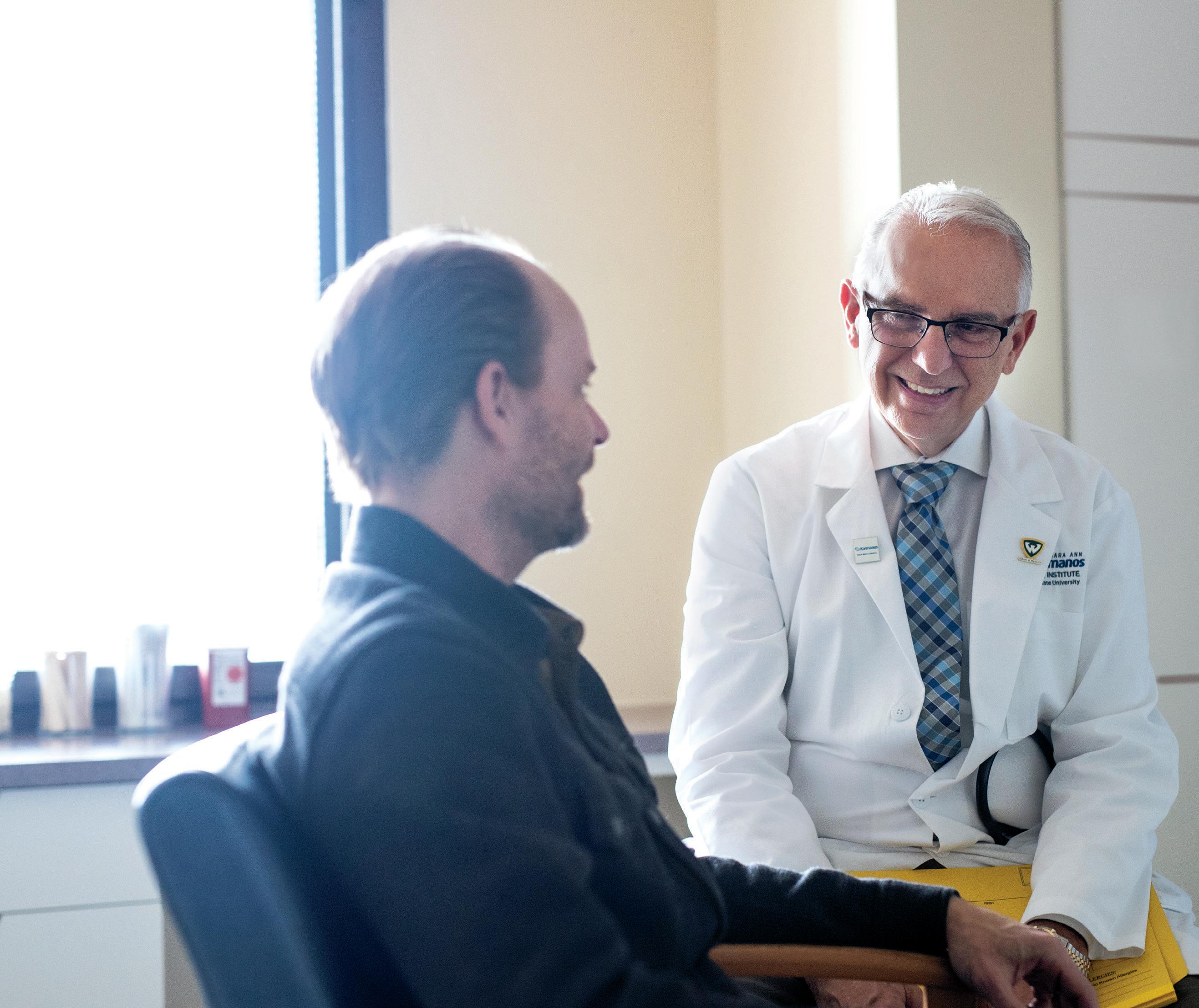
DETROIT
Karmanos Cancer Center at Karmanos Cancer Institute
BAD AXE
2. Karmanos Cancer Institute at McLaren Thumb Region
BAY CITY
3. Karmanos Cancer Institute at McLaren Bay Region
CLARKSTON
4. Karmanos Cancer Institute at McLaren Clarkston
FARMINGTON HILLS
5. Karmanos Cancer Institute at Lawrence and Idell Weisberg Cancer Treatment Center
FLINT
6. Karmanos Cancer Institute at McLaren Flint, McLaren Proton Therapy Center
GAYLORD
7. Karmanos Cancer Institute at McLaren Northern Michigan
LANSING
8. Karmanos Cancer Institute at McLaren Greater Lansing
LAPEER
9. Karmanos Cancer Institute at McLaren Lapeer Region
MAUMEE, OH
10. Karmanos Cancer Institute at The Toledo Clinic Cancer Center
MOUNT CLEMENS
11. Karmanos Cancer Institute at McLaren Macomb, Ted B. Wahby Cancer Center
MOUNT PLEASANT
12. Karmanos Cancer Institute at McLaren Central Michigan, Morey Cancer Center
PETOSKEY
13. Karmanos Cancer Institute at McLaren Northern Michigan
PONTIAC
14. Karmanos Cancer Institute at McLaren Oakland
PORT HURON
15. Karmanos Cancer Institute at McLaren Port Huron
ROSEVILLE
16. Karmanos Cancer Institute - Roseville
Non-Profit Organization US Postage PAID Permit 1579
Detroit, MI
TO BE A PART OF
7 3 6 8 9 4 5 1 2 10 12 14 15 11 16 13




 Joseph P. Uberti, M.D., Ph.D. Interim President and CEO
Joseph P. Uberti, M.D., Ph.D. Interim President and CEO
 Barbara Ann Karmanos Cancer Institute
Brian R. Gamble President Karmanos Cancer Hospital & Network
Barbara Ann Karmanos Cancer Institute
Brian R. Gamble President Karmanos Cancer Hospital & Network



















 Sara (the sunny-side-up egg in the center), her brother, mom, and her Karmanos care team dressed up on Halloween in 2019.
Sara on her last day of chemotherapy.
Sara (the sunny-side-up egg in the center), her brother, mom, and her Karmanos care team dressed up on Halloween in 2019.
Sara on her last day of chemotherapy.



